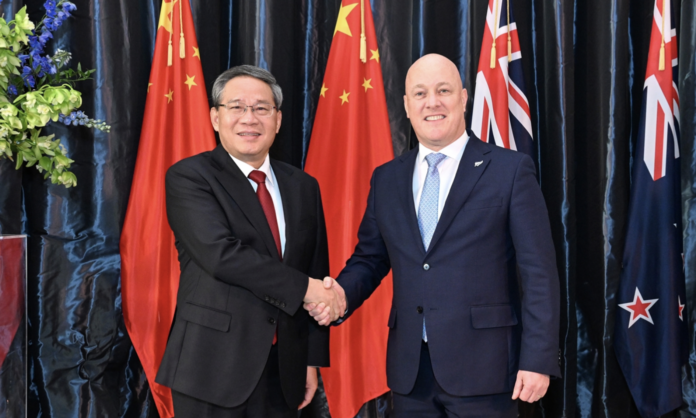The recent visit of Chinese Premier Li Qiang to New Zealand is now followed by his visits to Australia, with implications for China’s trade diplomacy and geopolitics.

On June 14, Li Qiang delivered a speech at a welcoming gala dinner at Auckland, emphasising the friendly and 52 years of diplomatic relations between China and New Zealand and their comprehensive strategic partnership. He added that China has remained New Zealand’s largest trading partner and biggest export market.
Li Qiang tactfully stressed the cooperative areas between the two countries, including environmental protection, agricultural development, ecological sustainability, low-carbon transition, and green technology. Then he shifted to emphasise the multicultural diversity of the two countries, which both value free trade, innovation, creativity, and the protection of intellectual property rights.
He stressed that both countries attach great importance to peace, dialogue, and cooperation rather than confrontation and conflict. Such cooperation includes areas like biomedicine, agriculture, food, the digital economy, tourism, educational exchange, cultural interactions, information technology, and energy.
Furthermore, bilateral cooperation can be forged through the support of UN-led international order and law, and the practice of multilateralism.
Li elucidated that the Chinese economy remains growth-oriented and resilient, leading to more opportunities for countries to share the fruits of common economic development.
The Chinese Premier also added that China requires the import of high-quality diary, beef and lamb products from New Zealand. He visited the New Zealand Institute for Plant and Food Research in Auckland, meeting and dining with businesspeople, academics, and officials.
China is now the largest trade partner of New Zealand with bilateral trade totalling NZ$38 billion.
Analysing Li’s speech and remarks, China has adopted an economically pragmatic trade policy to secure closer support from New Zealand. Although New Zealand is part of the AUKUS and a member of the US-led military and security alliance in Asia, Li Qiang skilfully avoided mentioning the sensitive issues in public but pragmatically focused on the cooperative areas of low politics with high economic values.
In recent years, the perception of the China “threat” has gained currency in New Zealand and Australia, which are worrying about China’s closer relations with some Pacific islands like the Solomon Islands. The territorial disputes between China and the Philippines over some reefs in the South China Sea have also alarmed Australia and New Zealand. Some politicians in Australia and New Zealand have appeared to overstate the Chinese “threats” by raising their concerns about Chinese united front work in their society and community.
As such, Li Qiang’s depoliticisation approach to dealing with New Zealand is a wise one, focusing on productive and economic areas with common consensus, while steering away from politically controversial terrains. The expansion in bilateral trade, further marketization, the improvement of high quality products and services, and the enhancement of mutual investments have become the hallmarks of Li Qiang’s visit to New Zealand.
Li’s pragmatic and depoliticising approach to emphasising trade diplomacy is likely to be revealed and repeated in his next visits to Australia and Malaysia. Australia’s relations with China have slightly improved recently after China scrapped its tariffs on Australian wine. China is expected to give two new pandas to the Adelaide Zoo, combining its panda diplomacy with trade diplomacy. Malaysia remains an important neighbour to China due to Kuala Lumpur’s relatively independent attitude towards Sino-US tensions. Hence, it can be expected that Li Qiang’s trade diplomacy and depoliticising but pragmatic approach will persist in his visits to Australia and Malaysia.
Li Qiang’s visit to New Zealand could also be seen as a follow-up action after Foreign Minister Wang Yi’s visit to Wellington in March 2024. Wang succeeded in upgrading the China-New Zealand Free Trade Agreement and launching negotiations on the negative list of trade in services. Li deepened China’s economic relations with New Zealand further, demonstrating perhaps a new pattern of Beijing’s go-south neighbourly diplomacy.
In conclusion, Li Qiang’s visit to New Zealand was not only a follow-up action after Wang Yi’s visit to Wellington, but also a new go-south good neighbourly diplomacy combining the focus on trade with the emphasis on productive and other common areas of cooperation. Li’s trade diplomacy towards New Zealand was carefully orchestrated, while such diplomacy is intermingled with panda diplomacy in his next visit to Australia. His final stop in Malaysia will be an important one showing China’s eagerness to reach out to countries that are relatively independent from the ongoing Sino-US rivalries in the Asia-Pacific region.
*Sonny Shiu-Hing Lo is a political scientist, veteran commentator, and author of dozens of books and academic articles on Hong Kong, Macau, and Greater China




















